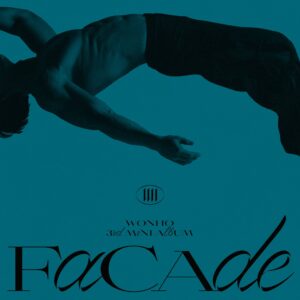
It is probably a little too arch a comment to make that Wonho and the concept of duality go hand in hand. As Seoulbeats’ own Victoria notes, he’ has been known for “his gentle, warm personality and sexy, ripped physique” since the days of Monsta X, and this tension has carried through into his work, straight from the start with the Love Synonym album series. He has a laser-pointed understanding of his brand as K-pop’s fluffiest beefcake (and what a moniker to have), which does indeed encompass an overt sultriness as well as sweet sincerity at different moments.
With all of this in mind, it is almost inevitable that the concept of the dual, or of multiple parts, would become the centerpiece of Wonho’s work at some point. It seems that the moment has arrived with Façade, his latest five-track mini-album. Wonho himself has acknowledged duality as the main theme of this album, and the concept of a façade immediately conjures up exciting ideas of disguise, inner and outer selves, pretense, and even trickery. It is not a new idea to the world of K-pop, perhaps because of just how much potential it carries, visually and musically. However, Façade is ultimately a disappointingly bland affair, taking a remarkably uncreative approach to such an intriguing subject.
The main disappointment with this album comes from the unanswered question of exactly what the façade at play is here. What are the dual elements being explored, and how do they relate to each other? It is hard to find any response to this that strays anywhere outside the normal structures of K-pop album track listings.
That is not to say that there isn’t promise. The album is bookended by an intro and outro, the first subtitled “9AM” and the latter “9PM”. Both of these instrumental pieces feature rhythmic tinkling mimicking old clocks, with the former featuring a decidedly minor key and a dramatic choir for good measure. There is a feeling of descent, echoed in the album’s artwork of Wonho falling horizontally through empty blue space. This is a notably subtle reference to entering a Wonderland-type world, free of explicit references to Alice or her friends, but still suggesting a transition from one world into another.
The titling of these two pieces also implies that the album is meant to represent a day in some way, perhaps through its ups and downs, or maybe even in being a slice of life. There is certainly a sense of peace in the outro that was absent from the intro: the key is more major, the choir has gone home for the day, and swirling violins have taken their place. As their own moments, these two bookends make a lot of sense and seem to set up some dualities themselves—morning and evening, lighter and darker, major and minor.
But in the actual songs of the album, these dualities largely fade into nothingness behind the far simpler dichotomy of sensual pop tracks vs sentimental ballads. It is a shame that the buck seems to stop here, as this particular set of opposites is one that is not only common in K-pop albums but almost expected.

The title track of the album gives us the smirking, groove-tinged pop of “CRAZY” that fits neatly into his formula. Adding growling electric guitar hooks to the calm but pulsating rhythm, much of the song’s structure feels like almost cutting and pasting from tracks like “Open Mind” and “Eye On You”. Pausing the instrumental while Wonho sings the title of the song, before dropping the music back in to accompany a fair simple structure, is certainly a signature, if not slightly overused by this point.
With a title that evokes ideas of the unusual and unexpected, “CRAZY” had the potential to be the song where Wonho could really experiment with his sound. There is a distorted deep voice rapping English lines as part of the chorus, but, whilst being a fun hook, is not in any way fresh or exciting. With songs like last year’s “Sticker” from NCT 127, or February’s “O.O” by NMIXX, we all know that K-pop can go as wild as it wants with structure or musical flourishes. But here, Wonho sticks completely to his formula.
On the other side of the “CRAZY” coin is “Close”, a ballad sung entirely in English. It is soft and tender, utilising the natural gentleness of Wonho’s voice, with a nice falling echoed refrain of “come close” and “I need”. But again, there is no creativity here, nothing beyond a simple love song of yearning to be close to a partner who changed his life.

The final track, “White Miracle”, is similarly bland, though the beat is a touch more forceful and the tone slightly more optimistic. Musically, this track listing does nothing beyond what other albums do to set a more bombastic title track alongside more gentle album songs. The possibility to play with duality in reflecting melodies, major and minor keys, or massive differences in rhythm, seems to be completely ignored.
There is slightly more of a conversation to be had around the lyrics of this album, however. “White Miracle”, originally a Japanese Christmas release, has a little ambiguity in what this “miracle” might actually be, with this particular word choice moving us away from the obvious guess of snow.
A white miracle comes down to you
I’ll bear your broken heart
I close my eyes and come to you little by little
There is also a reference to a memory, which, like the cause of the “broken heart”, is left unexplained.
A memory between the two of us piles on top
The reason why I waited for today

Here the lyrics actually suggest some questions of what exactly the storyline at play is, with the metaphor of the “white miracle” obscuring what is really being sung about. There is a slight sense of layering here, of a real story being hidden away, that could feed into the idea of a façade. This sense of real being hidden by something else is even more slight in “Close” with only the opening lines suggesting a difference between Wonho’s life before and after meeting the girl of the song.
All of my friends getting wasted
All of the lights slowly fading
I’m running out of patience
Someone get me out of here
I say suggestion here, because it really is a thin idea at best, particularly as Wonho deliberately specifies that it is his friends behaving in a different way, rather than himself. Again, the question comes up: where is this façade you’ve named your album after?
Ultimately the biggest duality in the album comes in the difference in tone between these two songs’ lyrics, and those of the title track. Far from the tender lover who just wants “to hold ya”, “CRAZY” is a wild, sensual character that wants attention and action.
Roller coaster
As you please, up and down
We’re going crazy
Mindlessly next round
There is an undeniable sexual undertone to these lyrics, making them possibly the most overt that Wonho has ever sung. Whilst, of course, lines like “Now move your body/Out of breath” are not explicit, they have an inviting and energetic pull that seems more direct than the music alone implies. The relative directness of this song in comparison to what follows marks two distinct approaches to relationships, with seemingly different goals and outlooks for sure.

However, once again, we are pulled back to the central problem: this isn’t a particularly exciting duality, nor an original or deeply explored one. Is the façade here the sexy hunger of “CRAZY”, with the two ballads representing Wonho’s more emotional side? If so, it is all at the surface level in this album. How these different facets interact, how they both came to be, what they mean for Wonho as a whole, all of this goes unexplored.
With little musical flare outside of the promise of the album’s introduction, and lyrics that contrast well, but explore so little, Façade fails in living up to the potential of its title. Now that Wonho has fully proven his abilities in the mid-tempo sensual funk arena, while never losing sight of his ballad-worthy softness, it is time for him to push further. Which such duality at the centre of his identity, now it’s time to really see what that can mean.
(YouTube. Lyrics via Genius [1][2][3]. Images via Highline Entertainment.)


